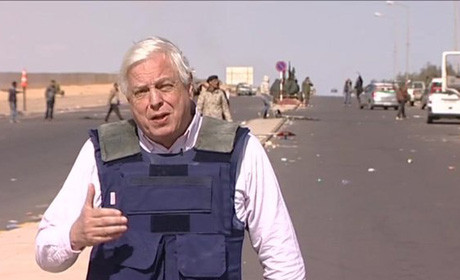
BBC correspondent John Simpson reports from Ras Lanuf, Libya in March this year
Credit: BBCThe BBC Trust has launched a review of the impartiality of the BBC's coverage of the Arab spring.
The review will examine the coverage of events in Tunisia, Egypt, Libya, Bahrain, Syria and Yemen across TV, radio and online platforms, but will exclude coverage by the BBC's local, regional and national services, and the World Service.
The BBC acknowledged that the events collectively referred to as the Arab spring were proceeded by other significant uprisings in the region, notably in Iran in 2009, but said that for "practical purposes" the review would be confined to events beginning in Tunisia in December 2010.
The review – which will be led by Edward Mortimer, senior vice-president of the Salzburg Global Seminar, former UN director of communications and expert in Middle East affairs – will be the fourth such impartiality review by the BBC. Previous reviews have examined domestic issues: coverage of business in 2007; network news and current affairs coverage of the UK nations in 2008; and science in 2011.
Mortimer said he was "honoured and excited" about being asked to lead the review.
"Events in the Middle East during 2011 up-ended many widely accepted notions about the region. Such stories are always the most exciting for journalists to cover, but also present many challenges. It will be fascinating to examine in detail how the BBC rose to these."
Alison Hastings, BBC trustee and chair of the Trust's editorial standards committee, said: "The events that came to be known as the Arab spring were extremely fast-moving and complex. That makes it a difficult story to cover.
"The challenge for the BBC, as with all controversial areas, is to ensure that it maintains the high standards of impartiality and accuracy that audiences expect, both in the UK and around the world, where many rely on the BBC's international news services.
"We are delighted that Edward Mortimer has agreed to lead this important review for the Trust – his distinguished record, and expertise, in both Middle East issues and journalism, will be a great asset."
The BBC's editorial guidelines state that impartiality is "the core of the BBC's commitment to its audiences".
"It applies to all our output and services – television, radio and online ... we must be inclusive, considering the broad perspective and ensuring the existence of a wide range of views is appropriately reflected."
Speaking at the London School of Economics in June, the director of BBC News, Helen Boaden, said that maintaining the broadcaster's impartiality was "an ongoing, daily battle".
"It is often in the tone and language and people often don't realise they are taking sides," she said.
"Our values demand impartiality. We don't always get it right but we work at it very hard on a daily, even hourly basis."
The review is due to be published in Autumn 2012.
To contact the Journalism.co.uk news desk email joel@journalism.co.uk / rachel@journalism.co.uk or call 01273 384 290
Free daily newsletter
If you like our news and feature articles, you can sign up to receive our free daily (Mon-Fri) email newsletter (mobile friendly).
Related articles
- How Reuters, Newsquest and BBC experiment with generative AI
- Standing out in a crowded market: what makes a top news podcast?
- Learning to explain well, with BBC News presenter Ros Atkins (part two)
- Learning to explain well, with BBC News presenter Ros Atkins (part one)
- How can UK commercial local news media respond to BBC expansion?









